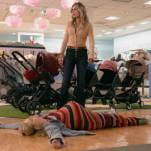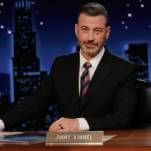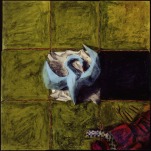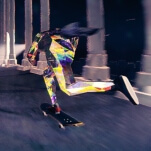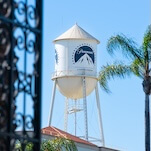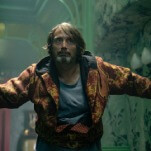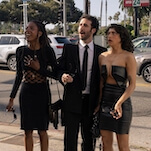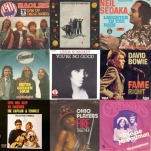A stirring disaster turns Ragnar Shakespearean on Vikings
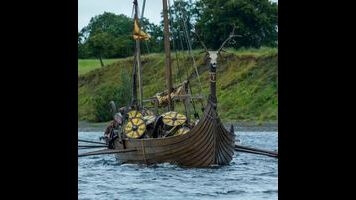
Well, that didn’t go well.
Ragnar’s return to Paris goes as badly as it could have because Ragnar is not Ragnar Lothbrok any more. In seasons past, Ragnar had lain low, has played the fool, or made it look like he was being fooled, before springing the iron trap he’s been hiding behind his back on his too-confident adversaries (and us). But “The Profit And The Loss” makes the case that that really doesn’t appear to be true this time around, as his blunt, literally shaky leadership of the Paris invasion leaves his forces decimated, a large number of his ships capsized and burning, his camp destroyed (and poor Helga horribly wounded), and everyone questioning his ability to lead. (The fact that Rollo—yes, Rollo—seems to have outthought him every step of the way is only the capper.) Even Bjorn, storming into Ragnar’s tent to demand the Vikings’ next move, snaps at his father, “We have waited three days for a plan of attack!,” before, taken aback at the sight of a jittery, muttering Ragnar, asks worriedly, “Father, are you all right?” Ragnar, it appears, is not, in fact, all right, as the camera reveals that he has been defending his plan to retreat back downriver to the severed head plopped in the mud at his feet.
As entertaining as it’s been to rest in the surety that Vikings’ protagonist will always pull victory right out from beneath his tunic at the last minute, there’s something invigorating, even frightening, at the thought that Ragnar’s time is up. Instead of the fun of watching Travis Fimmel’s dashing, enigmatic antihero dance right on the winning edge of disaster, the thought that Ragnar has lost his touch leaves Vikings careening rather thrillingly out of control. When he was just being a stoned, disaffected layabout alongside his sexy new lover/drug connection Yidu back in his Kattegat clubhouse, that was one thing, the light ever dancing in those icy blue eyes always hinting that his withdrawal from his duties was just another gambit to cope with his physical enfeeblement, and the confidence it lent smug, cocky new pretender Harald. But now, with untold losses of people and ships and the Paris invasion in serious jeopardy, Ragnar’s erratic behavior looks less and less like strategy and more like the final descent of a mighty king.
Of course, it could all be a longer con than ever before. Last season’s initial raid on Paris saw Ragnar—rather improbably—sacrifice much of his forces in order to snatch victory in the end with an incredibly convoluted and risky (again, some would say improbable) fake-out. He sacrificed a lot of himself, too, not only physically, but also in his relationships with those that mean the most to him. But he won. So could his Chinese medicine-chomping, wild-eyed, teeth-grinding, restless-legged indecisiveness be just another act whose real purpose will only be unveiled when Ragnar Lothbrok stands, once again, victorious and smiling on the parapets of Paris? Sure. But it’s also entirely possible—and, frankly, more interesting—to think that Ragnar’s crises of faith and competence are indeed the product of the deep disillusionment he confessed to Yidu back in Kattegat. That he’s a broken man, or a breaking one, who will either heal himself in time to rally his people once more to violent triumph, or shatter all to pieces.
Echoes of two great Shakespearean kings sound throughout “The Profit And The Loss.” (And if you hear some strains of Hamlet as Ragnar monologues to that severed head, you’re not alone.) Apart from the superficial analogy to Henry V, of an invading king leading his outnumbered forces into France (or Francia in this case), Ragnar’s history keeps us waiting for the charismatic king to pull off an inspirationally heroic, Agincourt-like stand against Rollo and Odo’s massed crossbowmen and booby-traps. In practice though, Ragnar turns more and more King Lear as the battle turns to rout, his daring rescue of the drowning Floki the only scrap of the old Ragnar we see. Instead, he jounces in his seat at the ships sail toward their doom, his gums and teeth stained red with Yidu’s drugs, his mind unable to focus. Asked beforehand about tactics, he gives the Rollo-esque order to simply “do the obvious” and sail right where the Franks expect them to go. We expect a secret, but Ragnar hasn’t got one, and his diversionary plan of having Lagertha’s troops come at the Frankish forts from behind fails spectacularly, literally getting stuck in the mud of an unseen marsh.
After the battle, too, there’s the war of kings, the fact that the dastardly Franks have massacred the women, old men, and boys left to guard the Vikings’ camp a direct allusion to the dastardly French doing the same during Henry V’s impossible victory at Agincourt. (I can hear Shakespeare’s stout Welshman Fluellen exclaiming, “Kill the boys and the luggage… ‘Tis as arrant a piece of knavery as can be offered!”) But, unlike Henry, whose furious “I was not angry since I came to France until this instant!” signaled his willingness to seemingly burn France to the ground, all Ragnar can offer is a stunned look and a grateful, tearful hug of sons Ubbe and Hvitserk upon seeing they (and Yidu) have survived the massacre. Then, seemingly shattered at all that’s happened, Ragnar retreats to Yidu, begging like the junkie he now appears to be for more medicine, and thrashing through her belongings until she reluctantly gives him some. A peal of thunder brings a Lear-like storm, and the battered king simply sits down on a boat in in pouring rain and looks, for all the world, like he’s gone mad. Earlier, when different rain in the form of the Franks’ catapulted oil-bombs set the river and his ships ablaze, Ragnar’s defiant bellow to the victorious Rollo above is suitably Lear-like as well, a mad king in the midst of disaster, railing at personal betrayal. “And this is how you repay me? When everyone wanted you dead, I kept you alive! And this is how you repay my love!”


